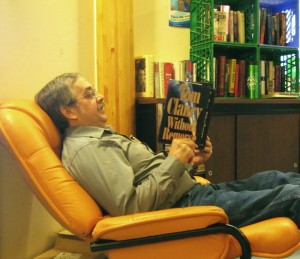 books is my most favouritest way of all to delightfully waste time – expecially “indulgent trash” (spies, mystery, & sci-fi).
books is my most favouritest way of all to delightfully waste time – expecially “indulgent trash” (spies, mystery, & sci-fi).
The premise, Is Books Making Us Stupid? (from week 4 of #Rhizo14 ) “just hit my berserk button.” (to quote from Haley Campbell when she rightfully took great exception to my calling it “indulgent trash” in an unrelated blog post some time ago)
Here I was just concluding that I need to subject myself to more D&G, Skinner, Mezirow, Brookfield, Knowles, Papert, etc. to get a deeper grounding in learning theory and jargon. Seriously, YouTube is where it’s at after all? For most lectures, including TedTalks, I want a transcript to scan the point in a fraction of the time it takes me to listen. Shallow? I think of it as efficient. I confess though, listening to Dave Cormier’s verbal explorations has a lot more “pull”.
I’m now challenged to reflect on orality in my own life. Childhood. Farming & Gardening. Facts of Life. All oral. Learning the largely-unwritten Tlı̨chǫ language as an adult on the trapline and in hunting camps filled my meaning of the expressions with images, smells, and cold instead of equivalent marks on paper. I lost my frustration with Aboriginal legends when I finally laid aside my Euro-centric demand that every moral and lesson be explicated. Orality is flexible, adaptable, but to a print-oriented society, is also undependable with a whispering-down-the-lane kind of unreliability. Uncertainty in my worldview was characterized as weak, probably slippery and devious, therefore to be rejected. I’m getting over it, convinced in part by the tremendous harm done by some kinds of certainty.
Back to this week’s premise. Books require the same Rheingoldian (or should that be Postmanesque?) “crap detector” we apply to anything else. I think it is our undue reverence for the bound printed page, not books themselves that hinder rhizomatic exploration of learning. Some day I’ll have to write about my ambivalence toward textbooks and syllabi.


Don’t forget that crap can be a valuable fuel 😉
I read this a while back, meant to come back, got distracted and have finally got back 🙂 Just wanted to say how much of this post resonates with me. My indulgent time-wasting trash is crime fiction 🙂 I am always thinking that I should read more of the serious stuff – in fact it was a target for this year – a target that I already know I won’t meet! I have also been wondering about oral storytelling as opposed to reading stories and I agree about crap detection although even if I can detect it, I can’t always resist it 🙂
Thanks for your comment Jenny. Oral storytelling is the substance; stories in books are only the shadow of it. But, because oral storytelling is time-intensive, and having a relationship with the storyteller makes demands as well, it is very pleasant to retreat to the undemanding entertainment available in books. (Ugh, that sounds utterly hedonistic and selfish when I put it so bluntly.)
I’m still chuckling over “I can’t always resist it” – and grappling with the implications of irresistible crap.